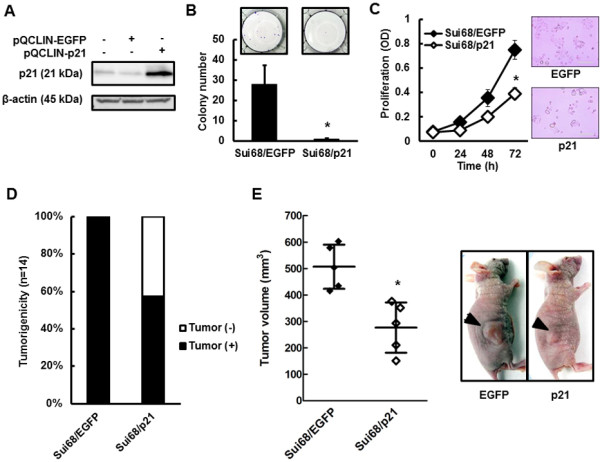Figure 8.

Role of p21 gene in colony formation and cellular growth in vitro and tumorigenicity in vivo. To see if p21 expression reverses the phenotype for ACVR1B gene homozygous deletion, we created a p21-overexpressed Sui68 cell line (homozygous deletion of ACVR1B gene and wild-type SMAD4 gene). (A) Western blot analyses. The overexpression of p21 was confirmed using western blot analyses in the Sui68/p21 cell line. β-actin was used as an internal control. (B) Colony formation of Sui68-transfectant cell lines. The colony formation in the Sui68/p21 cell line was suppressed, compared with that in the control cell line (EGFP, 28.0 ± 9.17 vs. p21, 0.89 ± 0.19, P = 0.035*). Columns, mean of independent triplicate experiments; Bars, SD; *P < 0.05. (C) Cellular growth of Sui68-transfectant cell lines. The cellular growth was evaluated using an MTT assay. Cellular growth in the Sui68/p21 cell line was suppressed, compared with Sui68/EGFP (0 h, P = 065; 24 h, P = 0.074; 48 h, P = 0.053; 72 h, P = 0.030*). Lines, mean of independent triplicate experiments; Bars, SD; *P < 0.05. (D) Tumorigenesis in vivo. To evaluate tumorigenicity in vivo, a suspension of 5 × 106 Sui68-transfectant cells (in 50 μL PBS) were subcutaneously inoculated into both flanks of nude mice (n = 7). Sui68/EGFP exhibited a significantly elevated level of tumorigenesis (Sui68/EGFP 14/14 vs. Sui68/p21 8/14, P = 0.016). (E) Tumor growth in vivo. To evaluate the tumor growth, a suspension of 5× 106 Sui68-transfectant cells (in 50 μL PBS) with 50 μL of Matrigel were subcutaneously inoculated into the right flanks of nude mice (n = 5). Sui68/EGFP exhibited a larger tumor volume than Sui68/p21 on day 15 (Sui68/EGFP, 507.0 ± 83.5 mm3 vs. Sui68/p21, 276.5 ± 95.0 mm3; P = 0.0036*). Lines, mean of five tumors; Bars, SD; *P < 0.05.
